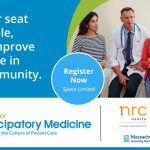
by Eric Bersh | Jan 19, 2026
The Everylife Foundation for Rare Diseases (ELF) held their annual Community Congress meeting on December 11, 2025 at the National Press Club in Washington, DC. The Community Congress acts as a coalition of collaborators with shared priorities, providing strategic...

by Eric Bersh | Nov 7, 2025
Editor’s Note: Recent SPM articles have given a high-level overview of the responses to some questions that the Society for Participatory Medicine suggested for the Beryl Institute – IPSOS PX Pulse: Consumer Perspectives on Patient Experience in the US (PX...
by Eric Bersh | Sep 10, 2025
Editor’s Note: Kevin Freiert and Dan Halpren-Ruder, MD are part of a group working to launch an exciting new SPM inititative, described here. The Promise Participatory medicine promises to enhance quality while potentially decreasing costs. By...

by Eric Bersh | May 29, 2025
Editor’s Note: This is the second part of Josh Rubin’s post. The first was published on May 23, 2025 Building Upon a Powerful Foundation of Patient Empowerment In part 1 of this post I paraphrased Dr. Casey Means (referencing Robert F. Kennedy, Jr.), noting that...

by Eric Bersh | May 23, 2025
Editor’s Note: This post (in two parts) builds upon email correspondence the author sent to Robert F. Kennedy, Jr. and key members of his Make America Health Again (MAHA) team beginning in November 2024. It aims to illuminate alignment between three principles (and...

by Eric Bersh | Feb 5, 2025
Mortality is a fabric more important than money, politics, and belief systems. We all share the same responsibility of health; the only variable is the time in our life we acknowledge it. Rare/undiagnosed consumer behavior is the most intense example of participatory...

by Mary Hennings | Dec 30, 2024
The news cycle is moving on, but the killing of Brian Thompson was awful, no matter how one feels about the shortcomings of the American health care system. In a recent New York Times opinion piece, Andrew Witty, president of the UnitedHealth Group, wrote that no one...

by Brenda Merriweather | Apr 26, 2024
During my doctoral study in nursing practice a couple of years ago, I learned about a champion of nursing informatics, Dr. Nancy Staggers. Dr. Staggers assisted in developing the American Nursing Association’s Scopes and Standards of Practice. She also contributed to...

by Eric Bersh | Apr 6, 2024
To implement successful change you must, unequivocally, understand the culture of the environment you are looking to change. Culture and change management are inextricably connected. Culture is a made up of a series of repeated, engrained, and expected behaviors and,...

by Brenda Merriweather | Jun 12, 2023
Editor’s note: The following column by Society for Participatory Medicine board member Brenda Merriweather originally appeared in this space in December 2021. We are excerpting from that column in recognition of “Advancing Health Equity Through Participatory...

by Eric Bersh | Jun 6, 2023
My brother Jacob was born with a chronic neurological condition that caused him permanent physical and mental disabilities. As the only other child in a single parent family, I was often with Jacob during his frequent hospital stays and doctor visits. It is through...

by Eric Bersh | May 24, 2023
At the Society for Participatory Medicine, we recognize trust and respect as a two-way relational dynamic essential to our mission to transform the culture of healthcare relationships so people can live their best lives (see our Participatory Medicine manifesto). And...

by Eric Bersh | Mar 14, 2023
Recently, there has been a large emphasis by organizations that are interested in addressing bias, health equity, and increasing diversity. The verdict is still out if these are real structural changes, or just surface statements that have no real impact. It is...

by Eric Bersh | Feb 1, 2023
Flash back to my article for the Society for Participatory Medicine last year: Let’s Save the Date and Make Patient Engagement Official in 2022. I’m here to deliver some great news: we tied the knot! By the power vested in clinical research, the FDA now pronounces us...

by Eric Bersh | Jan 11, 2023
I recently saw The Color of Care, a documentary highlighting the disparate and inequitable care received by Black and Brown individuals during the COVID-19 pandemic. During the movie, Executive Producer Oprah Winfrey opined that one of the primary issues with...

by Eric Bersh | Dec 14, 2022
“When someone is having an acute situation, that is not a teaching moment.” Peter Pitts I recently participated on a panel at the STAT Summit with two brilliant healthcare thought leaders, former FDA Associate Commissioner and current president of the Center for...

by e-Patient Dave | Oct 10, 2022
Join us in Boston, Thursday afternoon, October 20. Oct 20 update: Here is the updated Zoom link. The Society for Participatory Medicine believes that the culture of healthcare is not benefiting everyone equally and needs to change. And healthcare won’t get better...





















Recent Comments